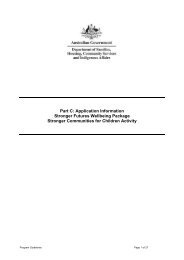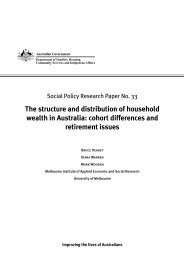What's the Answer? - Create
What's the Answer? - Create
What's the Answer? - Create
You also want an ePaper? Increase the reach of your titles
YUMPU automatically turns print PDFs into web optimized ePapers that Google loves.
• When young people were fur<strong>the</strong>r asked to give fur<strong>the</strong>r feedback about <strong>the</strong> potential stigmaattached to specialised services, <strong>the</strong> following responses were given: <strong>the</strong>re is a definite stigma associated with accessing specialised services: its impact orsignificance varies for each young person, with <strong>the</strong> greatest impact happening during <strong>the</strong> teenyears amongst peer groups, but it has less effect when you’re older <strong>the</strong>re’s more stigma attached to residential units than to young people in out of home care I think <strong>the</strong>re is a huge stigma attached to young people in out of home care, but I don’t think<strong>the</strong>re is a stigma attached to services that are specialised to assist young people in out ofhome care workers need to support young people and make sure that a negative stigma doesn’t stopyoung people accessing services <strong>the</strong>y need I think services need to be run to best serve clients, and if that means specialising <strong>the</strong>n that iswhat must be done; stigma can be removed <strong>the</strong> adolescents are not incompetent, yet <strong>the</strong>y may still need extra help <strong>the</strong>re isn’t any particular stigma attached to using existing specialised services, although <strong>the</strong>name of <strong>the</strong> service could have an impact on this and more general names are better e.g. oneof <strong>the</strong> government transitioning service in South Australia is Nor<strong>the</strong>rn Youth Support Services,a name that does not specifically identify it as being for young people in care attending specialist services can attract a negative stigma which young people leaving carewould be completely over after getting out of State care; but accessing specialised serviceswould still be okay. The logistics and public awareness of attending or engaging with <strong>the</strong>service, could affect young peoples’ willingness to engage with <strong>the</strong> service.Mainstream servicesPreferred service• Mainstream services were seen to offer: more variety and a normality which can be stabilising for young people more access and availability better processes and policies which make bigger and more established bureaucraciesaccountable for <strong>the</strong>ir service provision or lack of service, eg. obtaining a receipt number forenquiries, means your needs and requests are centrally logged and not lost in <strong>the</strong> system.Not preferred• Mainstream services attracted criticism because: <strong>the</strong>y’re more likely to ask a lot of questions you can’t answer or request irrelevant information,eg. like parent’s permission / information workers without specialist out of home care knowledge wouldn’t know about relevantentitlements, unless <strong>the</strong>y had special education and training. They should have specialisedprofessionals within a non-specialised service. <strong>the</strong>re wouldn’t be same guarantee of a ‘youth culture friendly’ reception from servicesfocussing on all ages <strong>the</strong> resources provided to mainstream services, would not allow <strong>the</strong> level of service provision –so services wouldn’t be available to all applicants, at levels appropriate or required of youngpeople leaving care <strong>the</strong>y have higher case loads and longer wait times.29




![pdf [107kB] - Department of Families, Housing, Community Services](https://img.yumpu.com/51272499/1/190x245/pdf-107kb-department-of-families-housing-community-services.jpg?quality=85)










![Land Claim - pdf [278kB] - Department of Families, Housing ...](https://img.yumpu.com/47002639/1/184x260/land-claim-pdf-278kb-department-of-families-housing-.jpg?quality=85)

![Borroloola Land Claim - pdf [299kB] - Department of Families ...](https://img.yumpu.com/46103973/1/184x260/borroloola-land-claim-pdf-299kb-department-of-families-.jpg?quality=85)